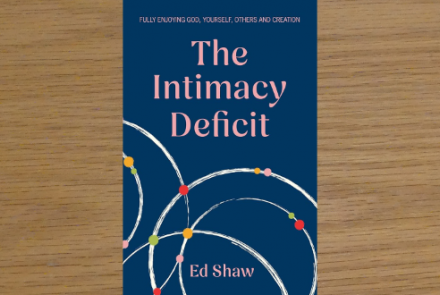Beyond Sexuality
In 2016, I told my parents about my struggle with same-sex attraction. Putting words to the secret I had kept locked up for nearly twenty years proved to be a pivot point in my love life.
Although I have always been attracted to girls, I have never wanted a same-sex relationship. Choosing to be single used to seem like a ‘forced choice’ – and the loneliness and isolation that accompanied it were things that just had to be endured. Now, I see my singleness as a profound opportunity. I’m not just saying it either, as I hope this article will demonstrate.
The change in perspective can be likened to taking my eye away from a magnifying glass. Our culture engenders an intense focus on desire and sexuality that the church, sadly, tends to reinforce rather than dispel. The cultural lens was distorting my whole view of my ‘self’ and the meaning and joy of life. Being attracted to girls merely heightened the focus, in the way that denial without something else to turn to tends only to increase our desire. Under the lens I had woven my identity, my joy, and my capacity to love into a knot of unsatisfiable desire.
Bringing my struggles out into the open made me open up to God. Letting God see me as I am has meant that He can start to show me how He sees things. He has set about unpicking the knot and teaching me to look beyond the magnifying glass.
My first lesson has been to see myself through His eyes. It is so simple I don’t need to dress it up - Loved. Not for anything, not because of anything, only through one thing - Grace.
My second lesson is in learning to see my sexuality through His eyes. Sexuality - our capacity for sexual feelings, and the significance of the ‘orientation’ of those feelings - is a way of viewing ourselves that is not carved in stone or fatalistically written into our genes. It is something our western culture invented. The idea of sexuality as a component of identity is a very novel concept in the history of mankind (hence why it doesn’t get mentioned in the Bible). But being new doesn’t mean it is better (another socio-cultural fallacy). As if sexual desire is a rigid enough framework on which to build our sense of self! A wealth of experience and observation tells us that sexual desire and even sexual ‘orientation’ are not constants; they are shifting sand banks, not safe places to build our identity.
So why do we attempt it? Our desires may be fickle, but we all have desire. Who we want and how we want them may vary like the direction of the wind, but the wind is always blowing. Yearning for others is human nature; we are made for love and we were made through love.
As people we are capable of many types of love. C.S. Lewis wrote about ‘Four Loves’, others have recognised love as a series of stages through which we develop as human beings. We can love parents and children, aunts and uncles, friends, pets, students, teachers, and many abstract things. Lovers are only part of our love lives. Our love lives extend towards many people, and for each of these others we must learn how to love with the right sort of love - loving a child well looks very different to loving a lover well.
What the Bible teaches us about God’s love for us is different. God’s relation to us is described in many ways; He is our teacher, counsellor, father, king and bridegroom. The Bible tells us that God loves each of us intimately, protectively, generously, joyfully and seriously – all at once. There is no partitioning of God’s love.
I see the difference between our human love and God’s love in the image of white light split by a prism into a rainbow of colours that are different wavelengths of visible light. God’s love is white light, shining full and bright into us. Through the prism that is our humanity, the white light is split into different wavelengths, different colours. Separated out in this way, we can grow into love and learn to live in its flow of photons without being blinded. The splitting does not lessen the beauty of the light – after all, we cannot look directly at the sun for its brightness, but who does not marvel at a rainbow!
Like the prism that receives and refracts the waves of light, we receive love from God and pass it on, refracted through our human nature. God created us with the capacity, desire, and need for love. He created us so that we could be participants in His love, giving and receiving as the Father, Son and Spirit give and receive. Sexual intimacy is only part of our capacity for love.
A hope centred on sexual intimacy and the satisfaction of sexual desire as the source of comfort and meaning is a vain hope. The lens of sexuality distorted my view of love, and the focussing of the light of love on one point in my life only left me burnt and hurting. Seeing the light of love passing through a prism rather than a lens is giving me a far more beautiful view of the possibilities of my love life. And it reminds me of the sign of the promise God gave to Noah, and gives to us – that no matter how much we mess up he will not abandon us. Jesus’ sacrifice means that through Him, our separate wavelengths of light are refocused; in Him our loves return to God as whole as white light.
Katie is a scientist and became a member of TFT in 2014.






